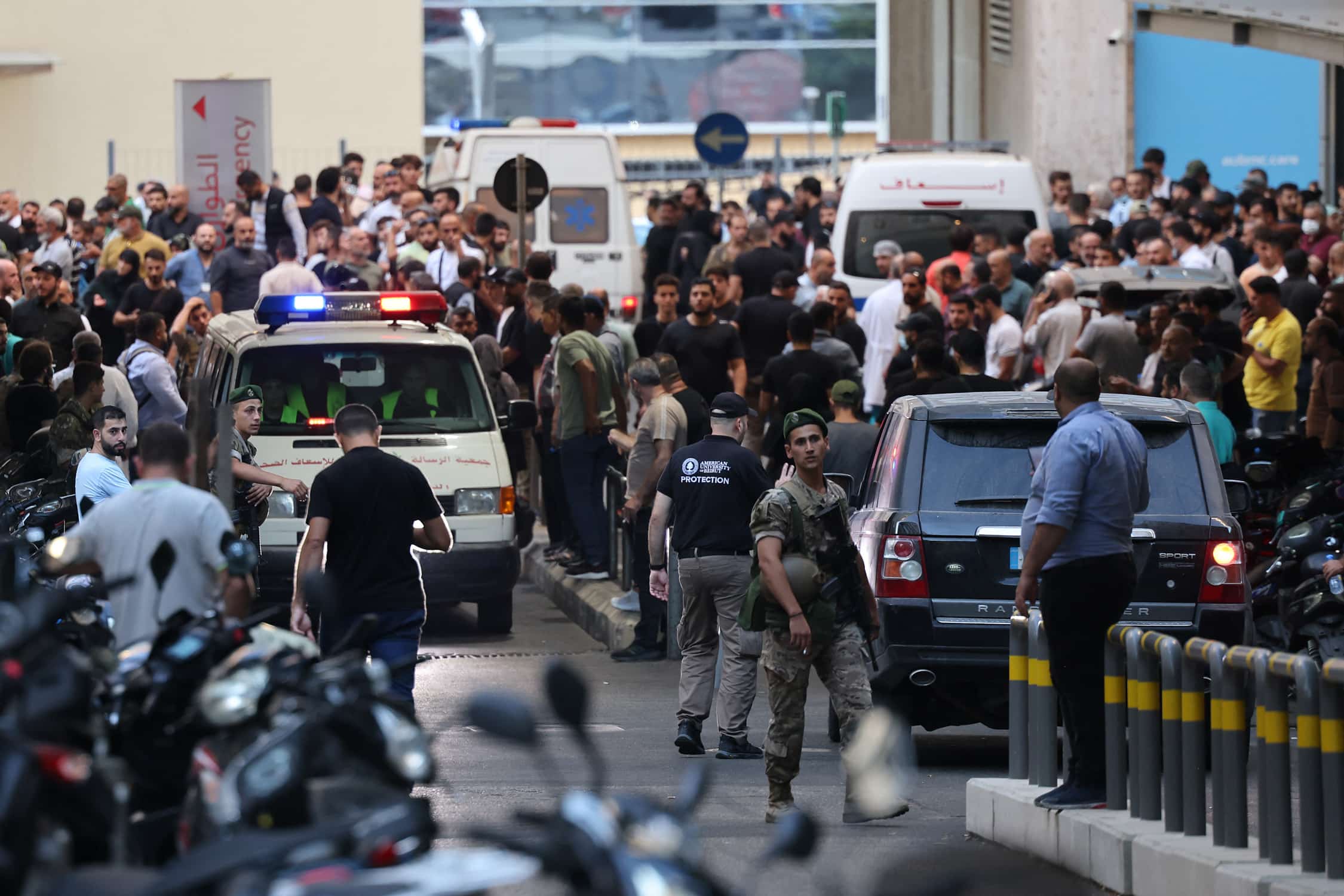
UNLIKELY WEAPONS Ambulances are surrounded by people at the American University of Beirut Medical Center on Tuesday, after explosions from pagers hit locations in Hezbollah strongholds around Lebanon amid tensions with Israel. —Agence France-Presse
BEIRUT, Lebanon — Hundreds of pagers used by Hezbollah members exploded across Lebanon on Tuesday, killing at least nine people and wounding some 2,800 in blasts the Iran-backed militant group blamed on Israel.
There was no immediate comment from the Israeli military on the wave of explosions, which came just hours after Israel announced it was broadening the aims of the war sparked by Hamas’ Oct. 7 attacks to include its fight against Hezbollah along its border with Lebanon.
The blasts “killed nine people, including a girl,” Lebanese Health Minister Firass Abiad said.
He added that some “2,800 people were injured, about 200 of them critically” with injuries mostly reported to the face, hands and stomach.
The 10-year-old daughter of a Hezbollah member was killed in east Lebanon’s Bekaa Valley when his pager exploded, the family and an Agence France-Presse (AFP) source close to the group said.
A son of Hezbollah lawmaker Ali Ammar was also among the dead, a source close to the group told AFP, requesting anonymity to discuss sensitive matters.
Tehran’s ambassador in Beirut was wounded in a pager explosion but his injuries were not serious, Iranian state media reported.
The influx of so many casualties all at once overwhelmed hospitals in Hezbollah strongholds.
At one hospital in Beirut’s southern suburbs, an AFP correspondent saw people being treated in a car park on thin mattresses, with medical gloves on the ground and ambulance stretchers covered in blood.
“In all my life I’ve never seen someone walking on the street… and then explode,” said Musa, a resident of the southern suburbs, requesting to be identified only by his first name.
UN Special Coordinator for Lebanon Jeanine Hennis-Plasschaert denounced in a statement “an extremely concerning escalation,” urging all sides to refrain from any action “which could trigger a wider conflagration that nobody can afford.”
‘Remote detonation’
Hezbollah blamed Israel for the blasts and warned it would be punished.
“We hold the Israeli enemy fully responsible for this criminal aggression,” the group said in a statement, adding that Israel “will certainly receive its just punishment for this sinful aggression.”
The United States, Israel’s top arms provider and close ally, was “not involved” and “not aware of this incident in advance,” said Department of State spokesperson Matthew Miller.
The afternoon blasts hit Hezbollah strongholds across Lebanon and dealt a heavy blow to the militant group, which already had concerns about the security of its communications after losing several key commanders to targeted airstrikes in recent months.
Analysts said Israeli intelligence services had somehow managed to infiltrate the supply chain used by Hezbollah for its pagers.
Charles Lister of the Middle East Institute said: “This was more than lithium batteries being forced into override. A small plastic explosive was almost certainly concealed alongside the battery, for remote detonation via a call or page.”
Israel’s spy agency “Mossad infiltrated the supply chain,” he said.
A source close to Hezbollah, asking not to be identified, told AFP that “the pagers that exploded concern a shipment recently imported by Hezbollah of 1,000 devices” which appear to have been “sabotaged at source.”
Unprecedented breach
The operation was an unprecedented Hezbollah security breach.
The Lebanese security source said the pagers were from Taiwan-based Gold Apollo, but the company said in a statement it did not manufacture the devices. It said they were made by a company called BAC which has a license to use its brand, but gave no more details.
Iran-backed Hezbollah has vowed to retaliate against Israel, whose military declined to comment on the blasts.
The plot appears to have been many months in the making.
The senior Lebanese security source said the group had ordered 5,000 beepers from Gold Apollo, which several sources say were brought into the country earlier this year.
Gold Apollo founder Hsu Ching-Kuang said the pagers used in the explosion were made by a company in Europe that had the right to use the firm’s brand, the name of which he could not immediately confirm. The company in a statement named BAC as the firm, but Hsu declined to comment on its location.
“The product was not ours. It was only that it had our brand on it,” Hsu told reporters at the company’s offices in the northern Taiwanese city of New Taipei on Wednesday.
Expanded war aims
Early Tuesday, Israel announced it was broadening the aims of the Gaza war to include its fight against Hezbollah along its border with Lebanon.
To date, Israel’s objectives have been to crush Hamas and bring home the hostages seized by Palestinian militants during the Oct. 7 attack that sparked the war.
“The political-security Cabinet updated the goals of the war” to include “the safe return of the residents of the north to their homes,” Israeli Prime Minister Benjamin Netanyahu’s office said in a statement.
Since October, the unabated exchanges of fire between Israeli troops and Hamas ally Hezbollah in Lebanon have forced tens of thousands of people on both sides of the border to flee their homes.
Not formally declared as a war by Israel, the exchanges of fire have killed hundreds of mostly fighters in Lebanon, and dozens including soldiers on the Israeli side.